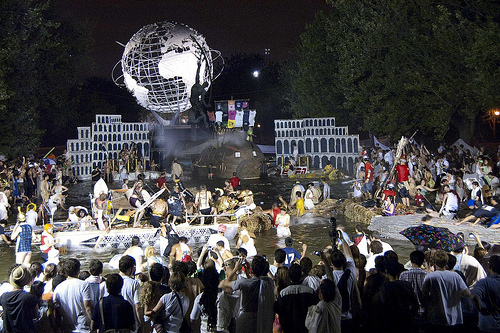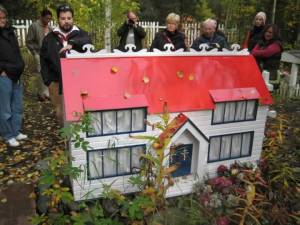Dear Leslie,

"Those About to Die Salute You," hosted by Queens Museum; artist Duke Riley. Photo by Frantz Vincent courtesy of Flickr
Thank you for the fantastic post. I too am approaching professional development through social media, as a consultant who serves this field. I wrote this post on my blog about how four museums in New York staged an art event using Twitter. I think it's a dynamic example of what you're talking about.
I began my museum career 20 years ago at Chicago Children's Museum. I was lucky enough to receive my first professional development at the Midwest Museums Conference. Over the years I began speaking at conferences: always a prerequisite for being able to attend a conference. Some employers paid my way, others allowed me to attend on the clock if I covered the costs.
I managed to get to at least one conference a year, which I found stimulating and enriching. One of the rules at the places I worked was that you had to do a presentation for the staff when you returned, so early on I began synthesizing the conference experience for my peers. [I don't know if this is common practice but I highly recommend it as a way to foster an atmosphere of professional development, as well as getting the most bang from your conference buck.]
It frustrated me that one association, like attendees at NAI , often had no idea about resources available through another, like VSA. I made it part of my core message to cross-pollinate ideas so that people weren't reinventing the wheel. Social media is ideal for this.
In the last five years I've heard these messages loud and clear: Conferences are expensive. Front-line staff can rarely afford to attend. Small and rural museums have a tough time ever affording consulting... maybe once in 25 years if they are doing a capital campaign or get a huge grant from IMLS or NSF. And when the economy tanked, so did conference attendance.

Dena'ina historian Aaron Leggett at the spirit houses in Eklutna at WMA '08. Online learning can't replace experiences like this, but used well offers great value.
When I was at WMA in Anchorage last year, I thought about all the museum staffers from Alaska who were able to make it to Anchorage, but aren't able to come to the Lower 48. While of course there is huge value in face-to-face interaction, I do believe there is a role for online experiences and training.
I hope I can encourage the field to utilize online learning and social media, as I think it's an incredible way to deliver assets, affordably, where they are most needed.
I look forward to hearing everyone's responses.
- Are you willing to try online learning?
- Have you attended a webinar? What did—and didn't—you like about it?
- What kinds of topics would you like to see offered in tech tutorials or online classes that relate to the visitor experience?
- What guest speakers would you like to hear from?
I am very open to everyone's thoughts and comments, as this is a new venture. It's such a privilege to serve this field. Leslie, thanks again for your thoughtful post. Sincerely,
Stephanie Weaver
Stephanie Weaver is the author of Creating Great Visitor Experiences: A Guide for Museums, Parks, Zoos, Gardens, and Libraries (Left Coast Press, 2007). She is a WMA professional member and visitor experience consultant based in San Diego, and is excited to be part of the WMA Host Committee for this year's conference. Her online learning website is experienceology.com/classes, and you can email her at sweaver [at] experienceology.com








Comments
This is a great post, Stephanie. you really go deep and wide and I just LOVE your write up of the QNS Museum event:
http://experienceology.blogspot.com/2009/08/how-some-ny-museums-used-soc...
that should be a must read for everyone on the field. thanks for digging into this.
Thanks James!
Add new comment